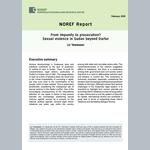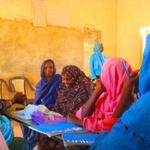Caught between rape and adultery
According to Sudanese law, rape is categorized as adultery without consent. In case of a trial, the burden of proof is on the woman who risks being accused of adultery. The present Sudanese law deters rape victims from bringing their cases to court. Women activists have put rape on the public agenda. They demand change.
-Non-state and state actors are launching reform initiatives. The need for legal reform is urgent, and there is broad consensus. Yet, there is no communication between the different stakeholders. International donors could contribute to the process by facilitating dialogue between non-state and state actors in Sudan, says Liv Tønnessen, senior researcher at Chr. Michelsen Institute.
She encourages international donors to support the current debate and promote further dialogue.
Rape on the agenda
There has not been any systematic national data collection on rape and sexual violence, hence it is impossible to assess the magnitude of such violations in Sudan. A combination of legal, institutional, social and political barriers has resulted in a lack of reporting, investigation and prosecution.
According to Tønnessen, who recently published the NOREF report “From impunity to prosecution? Sexual violence in Sudan beyond Darfur”, rape is not only occurring in conflict-torn Darfur, but also in other parts of the country, including the capital Khartoum. A recent and prominent example is the case of Safia Ishag, a women activist who was raped by the Sudanese national security forces. An interview with her was later published on YouTube, and caused turmoil nationally as well as internationally.
There is still a strong stigma associated with rape in Sudan. However, the strong international focus on sexual violence through various UN resolutions, has made rape an increasing public national concern. What was once taboo is now discussed in a public debate among women activists, state officials, health personnel, journalists and others. The debate is restricted, but even state media report on rape cases.
- The attention on rape and violence against women is increasing, and the government has recently taken a number of positive steps, says Tønnessen.
From impunity to prosecution?
One of these important measures is a special unit located in the Ministry of Justice aimed particularly at combating violence against women. Sudanese authorities have also decided to train police in international human rights law and criminal investigation, and to train health personnel who treat rape victims. In civil society, a mind baffling 149 forums for discussing violence against women have been established. The organisations are diverse, but united in the demand for differentiating rape from adultery in the current law.
Although reforms are on the way, Tønnessen stresses that it is still early days. The question of gender based violence is highly polarised and politicized, and Sudanese citizens are generally not consulted on government reform initiatives. There are also substantial differences in how the government and civil society define rape.
-Still, it is important to differentiate the rhetoric of high-ranking Islamists from what is actually happening at the lower level of government institutions that implement policies. The government does not operate as a unitary whole. There are indications of a generational gap. Younger Islamist women are more positive towards the human rights discourse, says Tønnessen.
There are also several institutions and units that receive funding from and cooperate with UN agencies, in which UN projects are being implemented. These government institutions and units cooperate in opposition to the stand taken by higher political levels. The various measures are a substantial contribution to potential changes and raising awareness.
-Legal reforms are not sufficient to combat sexual violence, but they will have considerable symbolic value. Important, first steps are being taken, says Tønnessen.
Publications

From impunity to prosecution? Sexual violence in Sudan beyond Darfur

Beyond numbers? Women's 25% parliamentary quota in post-conflict Sudan

Feminist interlegalities and gender justice in Sudan: The debate on CEDAW and Islam
Liv Tønnessen
Projects

Caught between rape and adultery in Sudan

